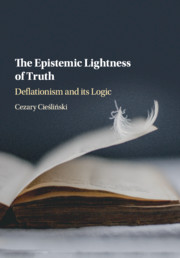Book contents
4 - Why Do We Need Disquotational Truth?
from Part I - Disquotation
Published online by Cambridge University Press: 30 November 2017
Summary
What is the truth predicate for? If the concept of truth is so light as to be fully characterised by the disquotational schema, why do we need it? Perhaps we could just as well eliminate it from our language? Contemporary disquotationalists usually answer the last question with an emphatic ‘no’. They typically say that the truth predicate has an important role to play; namely, it permits us to express general observations which otherwise could not be expressed. In this context, the disquotationalists often invoke Willard V. Quine as one of the precursors of their philosophical views on truth.
According to Quine (1986), speaking about the truth of a single sentence is plainly redundant: “So long as we are speaking only of the truth of singly given sentences, the perfect theory of truth is what Wilfrid Sellars has called the disappearance theory of truth” (p. 11). Truth is disquotation, and when applied to a concrete sentence, it can just as well be dispensed with. Nevertheless:
Where the truth predicate has its utility is in just those places where […] we are impelled by certain technical complications to mention sentences. (Quine 1986, p. 11)
I find the choice of words in the quoted passage very telling. Not only is truth dispensable in many applications, but where it is not, the reasons are not deep and mysterious at all. It is mere technical complications that explain our need for the truth predicate. But what are they? To quote Quine again:
We can generalize on ‘Tom is mortal’, ‘Dick is mortal’, and so on, without talking of truth or of sentences; we can say ‘All men are mortal’ […] When on the other hand we want to generalize on ‘Tom is mortal or Tom is not mortal’, ‘Snow is white or snow is not white’, and so on, we ascend to talk of truth and of sentences, saying ‘Every sentence of the form “p or not p” is true’, or ‘Every alternation of a sentence with its negation is true’.
According to Quine, the ‘technical complication’ in question is that we are not able to make sense of quantifying into sentence position.
- Type
- Chapter
- Information
- The Epistemic Lightness of TruthDeflationism and its Logic, pp. 58 - 67Publisher: Cambridge University PressPrint publication year: 2017



